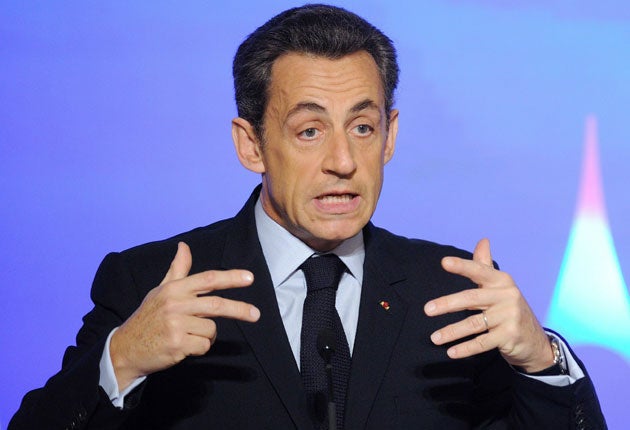Sarkozy lays out plans for 'moral' reforms of global money markets

Your support helps us to tell the story
From reproductive rights to climate change to Big Tech, The Independent is on the ground when the story is developing. Whether it's investigating the financials of Elon Musk's pro-Trump PAC or producing our latest documentary, 'The A Word', which shines a light on the American women fighting for reproductive rights, we know how important it is to parse out the facts from the messaging.
At such a critical moment in US history, we need reporters on the ground. Your donation allows us to keep sending journalists to speak to both sides of the story.
The Independent is trusted by Americans across the entire political spectrum. And unlike many other quality news outlets, we choose not to lock Americans out of our reporting and analysis with paywalls. We believe quality journalism should be available to everyone, paid for by those who can afford it.
Your support makes all the difference.Nicolas Sarkozy, President of France and "president of the world" until November, yesterday laid out plans to impose "moral" rules on global financial and commodity markets.
At a press conference devoted mostly to his 2011 presidency of the G8 and G20 groups of developed and emerging economies, Mr Sarkozy proposed sweeping ideas for a new world financial order in which global speculation would be subjected to new forms of global regulation. He acknowledged that many of his ideas had already been shot down by other countries and by the self-appointed guardians of "free" global markets in "the Anglo-Saxon press".
But he insisted that after the 2008 financial crisis and growing tensions over food and currency speculation, all members of the G20 should be ready to at least discuss his ideas.
President Sarkozy said that he would use his presidency of the two global bodies to push once again for a tiny tax on all "speculative" financial transactions. This would, he said, discourage speculative trading and create a multi-billion-dollar annual fund for "innovative" investment in poor nations.
The French President also called once again for a new "Bretton Woods" monetary system to regulate the respective values of the dollar, the Chinese yuan and the euro. In an entirely new proposal, he suggested a new global "social framework", which would influence working conditions, and implicitly wages, in all G20 countries, including China, India and Brazil.
Mr Sarkozy said that he would press for new rules to limit market speculation on food and other primary commodities, which he blamed for recent sharp increases in the price of wheat and other foodstuffs.
"Shortage fuels speculation and speculation fuels shortage," Mr Sarkozy said. "How can you explain that we regulate money markets and not commodities? If we don't do anything we run the risk of food riots in the poorest countries and a very unfavourable effect on global economic growth."
The sweep and ambition of Mr Sarkozy's programme is partly aimed at French centrist and centre-left voters before the presidential election in spring next year. This was only the third Paris press conference given by the President in nearly four years.
But the programme – far-fetched as it may seem to American or British commentators – also expresses President Sarkozy's long-held view that unbridled global capitalism needs urgently to be saved from itself.
According to a recent French parliamentary report, the nominal value of money "invested" in world financial markets has now reached 700,000 billion euros, or 12 times the "real" value of annual world GDP.
A distinction can be made, President Sarkozy insisted yesterday, between creative investment and useful commodity trading on the one hand and uncontrolled speculation on currencies or commodities on the other.
He rejected suggestions that his idea for a new global monetary system was intended to, or would, undermine the dollar. "Eighty-five per cent of world transactions are in dollars. We want to reassure our American friends that the dollar will remain a pre-eminent currency. But a pre-eminent currency does not mean the sole currency," he said.
Although he acknowledged that all his ideas would face stiff opposition within the G8 and G20, Mr Sarkozy said he hoped for real progress at the world summit in Cannes in November.
Join our commenting forum
Join thought-provoking conversations, follow other Independent readers and see their replies
Comments